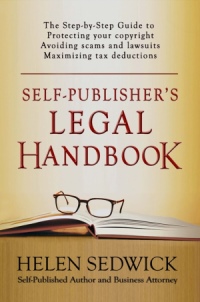Your writing is a business. Therefore, you need business accounts to run it, including a business bank account, credit cards, and methods to get paid by your clients. Today, author and attorney Helen Sedwick (@HelenSedwick) offers advice on how to create your business accounts and which ones you need. This post is the fourth in Helen’s series on the business side of writing and publishing.
In my earlier posts, I explained how operating as a business saves taxes, how to choose a business name, and how to obtain an EIN, Seller’s Permit and business license. The next step is setting up separate business accounts.
Running your writing income and expenses through bank accounts that are separate from your personal accounts has many benefits. The IRS is more likely to consider your writing a business if you maintain separate accounts. Plus, sorting business income and expenses at tax time will be a snap.
Open a Bank Account
Head down to your local bank with a copy of your certified FBN Statement, EIN, and driver’s license. You can set up an account online, but I find it easier to do in person. You’ll also enjoy seeing your bank officer’s eyes light up when you say you want to set up a business account. No need to be intimidated; banks want your business.
Open a basic business checking account, and get a credit card in the name of your business. You will not be using payroll or other services, so don’t let the bank talk you into opening an expensive account with services you don’t need. In addition, I would not set up a merchant services account that lets you accept credit cards through your bank. PayPal and Square are less expensive.
Once your bank accounts are opened, go online and open a business account at PayPal. (Yes, one that is separate from your personal PayPal account.) The free PayPal option provides enough functions for 99% of writers. Link your business PayPal account to your new business bank account and credit card.
Accepting Credit Cards
You can accept credit card and PayPal payments using your smartphone or tablet by signing up with Pay Pal Here, SquareUp (often called Square), or similar payment processing services. They mail you these gizmos that work through your cell phone to accept charges. The fee is 2.75% (give or take) of the amount charged, but there is no minimum monthly fee. Your bank is likely to charge a substantial minimum monthly fee for a merchant account.
Other Business Accounts
Set up separate business accounts with USPS, UPS, and FedEx in your business name and using your business credit card. Having separate accounts will help you keep track of business expenses.
Many writers rent a P.O. box to use as their business address. That way they keep their home address private.
CreateSpace, IngramSpark, Smashwords, and other Providers
Set up or update your accounts with CreateSpace, IngramSpark, Smashwords, and other providers.
- Give them your business EIN instead of your SSN.
- Direct royalties to be paid into your business bank account.
- Make your business credit card your default payment method.
- Give them your Seller’s Permit or Resale Certificate number so you may purchase copies of your book for resale without paying sales tax.
- IngramSpark may have you download a set of state forms to print, sign, scan, and return to them to establish your exemption from sales tax for books you buy from IngramSpark for the purposes of resale.
You don’t need to leave the money in your business accounts forever. Once you are earning income, allow a few hundred to accumulate in your account. You can withdraw the rest and use it for personal expenses. In other words, pay yourself!
Recordkeeping
Keeping good business records is critical for protecting your rights and saving at tax time. When it comes to tax audits, more people are penalized for losing receipts than for cheating.
Dedicate a file drawer (real and virtual) to your publishing business. I prefer clear, plastic, stackable file boxes since the IRS likes to see paper.
Keep the following:
 Contracts. Retain copies of all agreements with freelancers and POD providers as well as related correspondence, especially if the correspondence contains assurances, explanations, and special offers.
Contracts. Retain copies of all agreements with freelancers and POD providers as well as related correspondence, especially if the correspondence contains assurances, explanations, and special offers.
Licenses. Whenever you pay for images, fonts, lyrics, and other content, print out the receipt and business terms. Most online sites have a print-friendly version, but if not, save a screenshot.
Receipts from sales. Buy a receipt book that creates duplicate receipts, and write out a receipt every time you sell a book. I also make out a receipt for myself when I give a book away.
Financial records. Save bank, credit card, PayPal, and other statements.
Government correspondence. Save everything you send to or receive from the IRS or any governmental entity, including copies of every check sent.
Screenshots. If you run ads, or if you are interviewed, reviewed, or featured on any website, save screenshots.
Some not-so-obvious records.
- Schedules from conferences you attend, particularly if you spoke at them
- Takedown notices
- Appointment books and calendars
- Manuscript critiques
- Fan emails
- Contest entries and notifications
- Correspondence with publisher and agents, including rejection letters
Home expenses. If you use part of your home regularly and exclusively for your writing business, then you may be able to deduct a percentage of your overall home costs (mortgage/rent, insurance, utilities, maintenance, taxes). So keep everything from mortgage statements to garbage bills.
Mileage log. Buy a simple calendar to keep in your car. On the day you get it, write down the mileage on your odometer. From now on, write down your odometer reading on every January 1 (or as soon after that date as your remember).
The IRS requires that you keep a cotemporaneous log of all business-related miles so every time you use your car for writing-related reasons, write down where you went and the mileage. Or use your phone to take a picture of the odometer. That records time and place.
Writing-related driving includes trips to conferences, readings, research sites, post office, and bank. I doubt it includes long drives to seek inspiration or blow off steam.
How Long Should You Keep Business Records?
Keep contracts and licenses for as long as your book is on the market. You never know when you will have to remind a someone that you did pay for an image and have the right to use it.
Keep financial records for seven years. Some people say three, but if you are starting a business, I suggest seven years in case you have to prove to the IRS that writing and publishing are your business and not a hobby.
If you would like more details about business set-up, I recommend Publishing Business in a Box, a kit I wrote for Author Toolkits. Not only does it break down the process into easy-to-follow steps, but the kit also includes various sample contracts such as a freelancer agreement, interviewee release, and non-disclosure agreement.
About the Author
 Helen Sedwick is an author and California attorney with thirty years of experience representing businesses and entrepreneurs. Publisher’s Weekly lists her Self-Publisher’s Legal Handbook as one of the top five resource books for independent authors. Her blog coaches writers on everything from saving on taxes to avoiding scams. For more information about Helen, check out her website at helensedwick.com.
Helen Sedwick is an author and California attorney with thirty years of experience representing businesses and entrepreneurs. Publisher’s Weekly lists her Self-Publisher’s Legal Handbook as one of the top five resource books for independent authors. Her blog coaches writers on everything from saving on taxes to avoiding scams. For more information about Helen, check out her website at helensedwick.com.
Disclaimer: Helen Sedwick is an attorney licensed to practice in California only. This information is general in nature and should not be used as a substitute for the advice of an attorney authorized to practice in your jurisdiction.
Photo courtesy of Irina Siryanova / 123RF.com.
